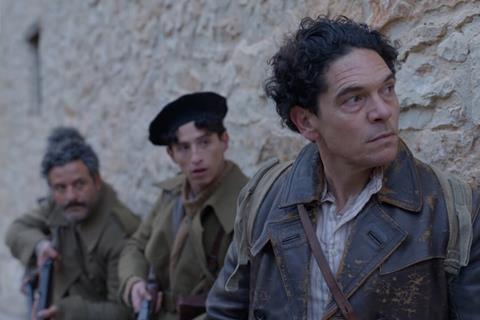Compassionate debut from Marc Ortiz Prades is set in the early 20th century and premieres in Seville

Dir/scr: Marc Ortiz Prades. Spain. 2025. 110mins
A Valencian-language historical drama whose message resonates with the identity politics of the present, Marc Ortiz Prades’ debut The Bad Names tells the solemn, haunting tale of the troubled life of Florencio Pla, better-known in Spain as ‘La Pastora’, the Shepherdess. An intersex person from early 20th century rural Valencia, Florencio’s difference made him a born outsider, and Ortiz Prades’ film, part of a long-overdue rehabilitation of this tragic figure from the footnotes of history, recounts with compassion and care a brutal life lived in spectacularly brutal times.
Marinero never allows us to forget the fragility inside this hulking, taciturn figure
The feature premieres on home turf in Seville, and further festival screenings are likely for this intriguing film which has found contemporary relevance in the unlikeliest of places.
In 1917, in a village in the mountains of eastern Spain, a child is born. The doctor hastily decides it is a girl, thereby condemning Florencio – a name he was only formally assigned in the latter part of his life, after years of being called the ‘bad names’ of the title – to a lifetime of misery and alienation. Known as a child as Teresa (Alex Bausa) – the first of Florencio’s ’bad names’ – and wearing girls’ clothes, he tends and talks to the sheep and is inevitably mocked by the local schoolchildren.
Following the death of his father, Florencio (now played by Adria Nebot) bids farewell to his mother (Patricia Bargallo); one of several wrenching scenes in a film that nevertheless diligently sidesteps sentiment. He starts to work humping huge bales of wool around from village to village as he seeks, but fails to find, recognition as the man he feels himself to be: one of his clients is Maria (Raquel Ferri), for whom Florencio will harbour a secret but unnameable love, despite her relationship with Miquel (Jaime Madaula).
With the outbreak of the Spanish Civil War, Florencio (now played by Pablo Marinero) offers to join his local unit on the Republican side, but is flatly turned down with the comment that “war is no place for you”. The problem for Florencio is that there is no place for him at all – until after the war is over, when he is selected, because of his usefulness as a tough guy who dresses like a woman, to be a member of the maquis, the political resistance groups who continue to live and fought in the mountains. (Florencio is now known as ‘Durruti’, after the fabled anarchist leader.) This section is the liveliest, with the maquis living in constant fear of discovery by the Civil Guard, and Florencio encountering a kind of begrudging comradeship. The script is good on the little, local details: bad names, for example, is the term given to the nicknames used by the maquis to avoid discovery.
Later, the real-life Florencio would acquire the nickname of ‘La Pastora’, a terrifying figure framed by Francoist propaganda as a wild outlaw, half man and half woman, to whom any unexplained murders of fascists could easily be ascribed. Unfortunately however, Florencio’s social significance within Spain goes largely unexplained in the film, robbing it of its wider meaning for non-Spanish audiences.
Marinero plays Florencio as the illiterate, tragic and isolated figure he actually was, condemned to a life of being what others deemed him – or rather his body – to be. The actor fulfils this tricky assignment – part man, part historical symbol – by never allowing us to forget the fragility inside this hulking, taciturn figure with his haunted eyes. But neither does the performance go very deep psychologically, since Florencio, finally a pragmatic sort of chap, has clearly decided to stoically endure his fate rather than suffer.
Many years are spanned, and many minor characters move in and out. Structure is supplied by the use of six titled chapters, giving the drama a sometimes fragmented feel. Alberto Banares’s photography renders the grinding poverty of these oppressed communities, whilst celebrating the majestic beauty from the forested landscapes of this part of Spain. But the visuals can feel contrived, as in one striking but too-picturesque image of the silhouetted band of maquis making their way along a mountain ridge.
The use of a boxy 4:3 ratio conveys the sense of emotion being held in check, allowing for a tighter focus on Florencio’s enduring pain in an unforgiving moral climate where displays of feeling are too rarely encountered. The haunting score, dominated by ethereal female voices, is sometimes really beautiful, but more often dark and discordant, and is key to establishing the film’s generally ominous tone.
Production companies: Admirable Films, Lamalanga Productions, tvON Producciones
International sales: tvON Producciones info@tvonproducciones.com
Producers: Paloma Mora, Marc Munoz
Cinematography: Alberto Banares
Production design: Maitica Gilabert
Editing: Gal-la de Yzaguirre
Music: Maria Bertomeu, Marina Alcantud y Teresa Nunez
Main cast: Pablo Molinero , Alex Bausa, Adria Nebot , Morgan Blasco, Raquel Ferri, Isak Ferri










![[Clockwise from top left]: 'The Voice Of Hind Rajab', 'A House Of Dynamite', 'Jay Kelly', 'After The Hunt', 'The Smashing Machine'](https://d1nslcd7m2225b.cloudfront.net/Pictures/274x183/1/7/0/1459170_veniceawards_837515.jpg)













